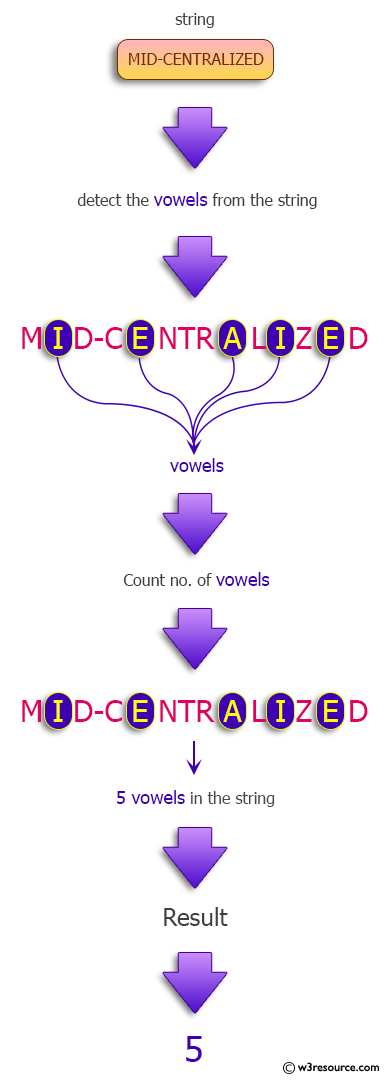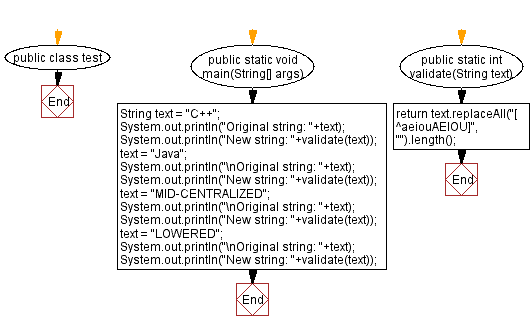Java programming Exercises: Count number of vowels in a given string using regular expression
Java Regular Expression: Exercise-14 with Solution
The word vowel comes from the Latin word vocal is, meaning "vocal" (i.e. relating to the voice). In English, the word vowel is commonly used to refer both to vowel sounds and to the written symbols that represent them (a, e, o, u, y), and sometimes I
Write a Java program to count number of vowels in a given string using regular expression.
Here we consider a, e, i, o, u are vowels (not y).
Sample Solution:
Java Code:
public class test {
public static void main(String[] args) {
String text ="C++";
System.out.println("Original string: "+text);
System.out.println("New string: "+validate(text));
text ="Java";
System.out.println("\nOriginal string: "+text);
System.out.println("New string: "+validate(text));
text ="MID-CENTRALIZED";
System.out.println("\nOriginal string: "+text);
System.out.println("New string: "+validate(text));
text ="LOWERED";
System.out.println("\nOriginal string: "+text);
System.out.println("New string: "+validate(text));
}
public static int validate(String text) {
return text.replaceAll("[^aeiouAEIOU]", "").length();
}
}
Sample Output:
Original string: C++ New string: 0 Original string: Java New string: 2 Original string: MID-CENTRALIZED New string: 5 Original string: LOWERED New string: 3
Pictorial Presentation:

Flowchart :

Java Code Editor:
Contribute your code and comments through Disqus.
Previous: Find and replace a word in a given string.
Next: Remove all the vowels of a given string and return the new string.What is the difficulty level of this exercise?
Test your Programming skills with w3resource's quiz.
Java: Tips of the Day
What is the best way to filter a Java Collection?
Java 8 (2014) solves this problem using streams and lambdas in one line of code:
List<Person> beerDrinkers = persons.stream()
.filter(p -> p.getAge() > 16).collect(Collectors.toList());
Use Collection#removeIf to modify the collection in place. (Notice: In this case, the predicate will remove objects who satisfy the predicate):
persons.removeIf(p -> p.getAge() <= 16);
lambdaj allows filtering collections without writing loops or inner classes:
ListbeerDrinkers = select(persons, having(on(Person.class).getAge(), greaterThan(16)));
Ref: https://bit.ly/3uwYid6
- New Content published on w3resource:
- HTML-CSS Practical: Exercises, Practice, Solution
- Java Regular Expression: Exercises, Practice, Solution
- Scala Programming Exercises, Practice, Solution
- Python Itertools exercises
- Python Numpy exercises
- Python GeoPy Package exercises
- Python Pandas exercises
- Python nltk exercises
- Python BeautifulSoup exercises
- Form Template
- Composer - PHP Package Manager
- PHPUnit - PHP Testing
- Laravel - PHP Framework
- Angular - JavaScript Framework
- Vue - JavaScript Framework
- Jest - JavaScript Testing Framework
